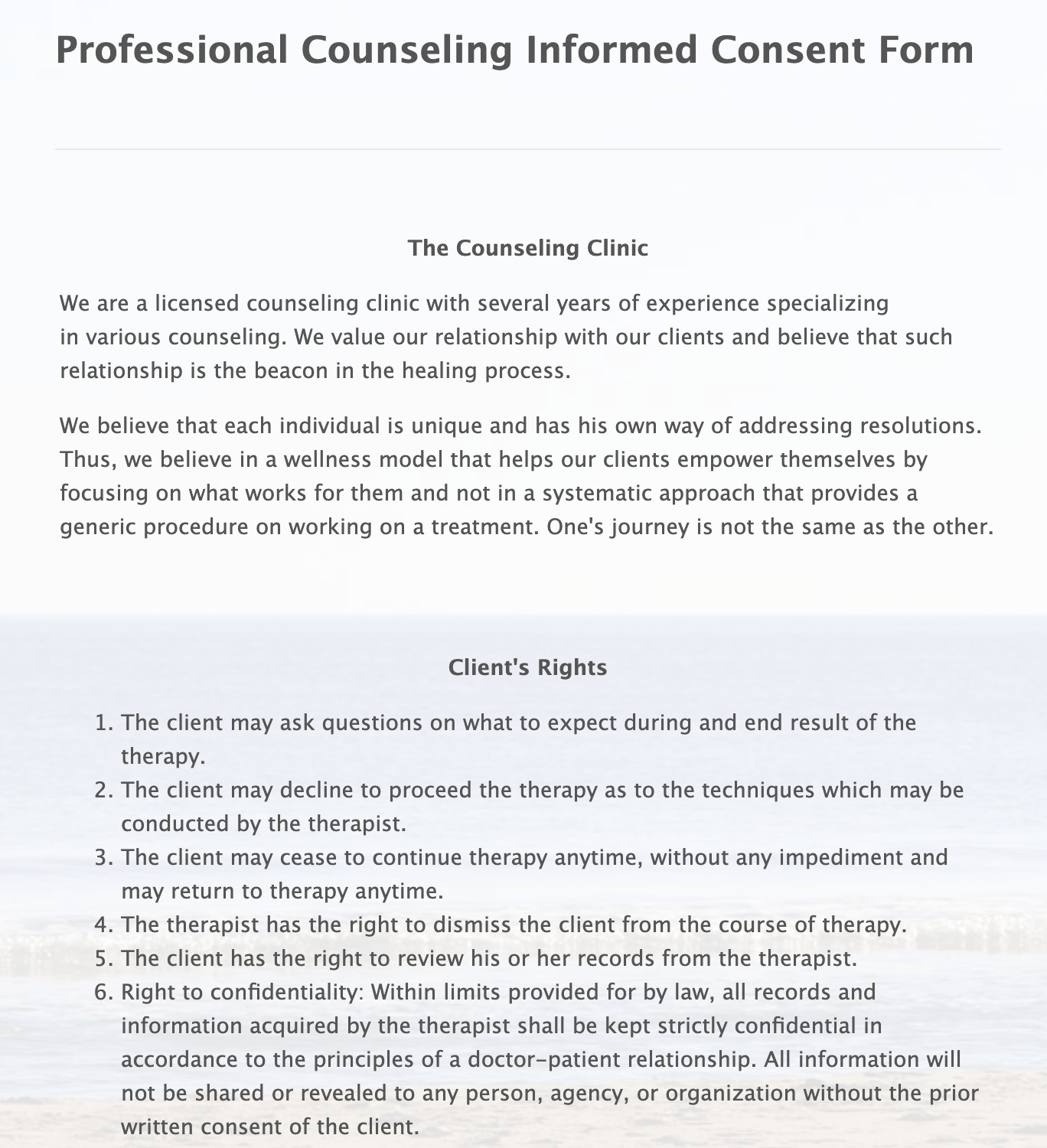If you’ve ever received any type of medical treatment at a hospital, chances are you’re familiar with the concept of informed consent. The basic idea is simple: Before a patient receives treatment, it’s the ethical and legal responsibility of the provider to outline any risks and possible outcomes.
Most people wouldn’t blindly sign up for an operation without fully understanding what could occur during or afterward — whether it’s a mild side effect or a life-threatening complication. Informed consent provides a safeguard for the patient’s well-being as well as a form of legal protection for the doctor or counselor.
If you’re new to counseling, the idea of informed consent may bring up some questions. Perhaps you’re wondering what exactly the counselor is legally required to do and whether informed consent in counseling is the same as for any other medical treatment.
In this article, we’ll outline the basics of informed consent and why it’s important, and we’ll explain how counselors can conveniently document a patient’s consent to treatment.
Just so you know
Ditch paper forms — gather informed consent and e-signatures fast with Jotform’s online informed consent forms.
The basics of informed consent in counseling
Informed consent in relation to counseling doesn’t really differ from informed consent for any other medical treatment you may receive. According to the code of ethics for the American Counseling Association (ACA), “Counselors have an obligation to review in writing and verbally with clients the rights and responsibilities of both counselors and clients.”
The main purpose of consent is for clients to choose whether they want to enter into a specific counselor-patient relationship. If the counselor clearly establishes the treatment plan at the beginning of counseling, a person can make an informed decision about whether they think this is the best course of action for their mental health.
If the counselor has a specific plan in mind that doesn’t work for their client, that’s the time to suggest changes or for the patient to clearly express what they do or don’t want to experience.
Why informed consent in counseling is important
Research suggests many healthcare providers rarely meet the minimum standard of obtaining informed consent from their patients, despite the applicable laws. While most people would agree the process is important, providers don’t always collect consent properly. Patients often speak with their doctors and counselors mainly in an attempt to develop trust rather than make actual decisions together.
It’s true that most people choose their doctors based on how trustworthy they seem. Of course, they may also choose them based on a recommendation, which is a clear sign that someone else trusts them. But failing to obtain consent from clients can get counselors into a lot of legal trouble if everyone isn’t in agreement.
It’s also a risk to assume someone will prefer a specific type of therapy without the practitioner first learning whether the client can see the benefit of it or whether they’ve tried such a therapy before.
It’s important to clearly lay out the treatment plan for clients because they may, for some reason, have problems meeting the counselor’s expectations. For instance, a marriage counselor may suggest a plan that will require several hours of homework each week — and one spouse doesn’t have the time to commit. Rather than consenting to this particular therapy, it would be better for the patients to be up front about what they can realistically do.
A final important aspect of informed consent is related to treatment cost. Imagine you agreed to family counseling for your partner and each of your five children. You may have thought the price of services would cover everyone, but when the bill comes, you realize the therapist charged you a separate fee for each child’s breakout sessions. It would not only be a shock to your budget, but it would surely erode some of your trust in the counselor if you felt they weren’t clear about charges during the first session.
The informed consent agreement
Now that we’ve outlined the importance of the agreement, let’s take a look at what you may find in an informed consent document. While all forms might look a little different, here are the main elements the ACA outlines in its code of ethics:
- The nature of all services provided
- Any issues related to purposes, goals, techniques, procedures, limitations, potential risks, and benefits
- The counselor’s qualifications, credentials, relevant experience, and approach to the counseling they’re providing
- Continuation of services upon the counselor’s incapacitation or death
- The role of technology in the counseling services
- Any other information pertinent to the services provided
When counselors should obtain informed consent
Counselors should take care of informed consent as soon as possible once the patient seeks counseling services. This will probably be at the very first session, which often acts as a meet and greet for the client and counselor.
The counselor can take this time to outline exactly what they hope to accomplish in the timeline of their services. This is also the time when a patient can decide it’s not for them. If the plan doesn’t work for both the counselor and client, the client can elect not to give informed consent and terminate the relationship.
How to collect informed consent in counseling
Counselors are required to collect informed consent for each patient, so it’s best to have an easy and convenient way to do that. After all, you don’t want to risk using a system that won’t protect both you and your client if the relationship goes awry.
Jotform offers online HIPAA-friendly informed consent forms that counselors can use. You can choose an existing template designed specifically for counseling services or easily create a new one from scratch using the drag-and-drop Form Builder. Your clients can digitally sign their informed consent form using trusted services like Docusign, AdobeSign, or Jotform’s e-signature widget, and Jotform will keep everything safe in your account.












Send Comment: